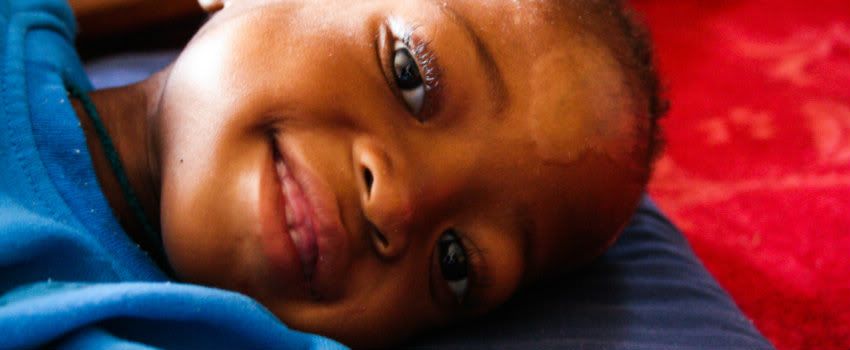

Research has demonstrated that meeting the psychosocial needs of children is a critical element of early childhood development (ECD), and is especially critical for the health and development of children living with HIV or the effects of HIV. Psychosocial support of children also includes the attachment needs of the child, by promoting healthy interactions and bonding with their caregivers, and limiting the amount of time spent away from the caregiver during the child’s most formative years. Given the country’s current HIV epidemic, high levels of poverty, and challenging and isolated terrain, many families find it difficult to have regular contact with their children during their Safe Home rehabilitation. In order for psychosocial support of children to be sustainable, it must be carried out by a child’s primary stable caregiver. An essential element of this is the empowerment of a child’s primary caregiver through training and supervision in order to develop expertise and confidence in supporting their child in a psychosocial as well as physical manner.

 The project will
be focused on involving children’s community caregivers in the Safe Home
rehabilitation process by providing transportation and accommodation in
Mokhotlong Camp Town for a 1-week period leading up to a child’s Safe Home
graduation, along with monthly visits. During the time caregivers are present
on the TTL campus, they will receive nutritional and ECD training support from
the TTL Safe Home supervisor and staff. This will allow them to practice what
they have learned in a supportive environment. Working off international
rehabilitation programs with demonstrated success, TTL aims to foster the
attachment between child and caregiver, and bolster the long-term
sustainability of our services through caregiver training and empowerment. We are currently waiting on the funds to implement this project, with a possible start date sometime in January 2016. However, in order to address these issues as soon as possible, Sentebale provided us with funds to implement a cluster workshop to trial presentations and trainings before the pilot program begins. 16 community caregivers joined us for a three-day training session which featured presentations on nutrition, early childhood development, meal preparation, child protection, management of childhood illnesses, staging HIV, HIV medication and client compliance of TTL services. It was a huge success with all women partaking reporting that they learned a lot and look forward to the implementation of the pilot scheme.
The project will
be focused on involving children’s community caregivers in the Safe Home
rehabilitation process by providing transportation and accommodation in
Mokhotlong Camp Town for a 1-week period leading up to a child’s Safe Home
graduation, along with monthly visits. During the time caregivers are present
on the TTL campus, they will receive nutritional and ECD training support from
the TTL Safe Home supervisor and staff. This will allow them to practice what
they have learned in a supportive environment. Working off international
rehabilitation programs with demonstrated success, TTL aims to foster the
attachment between child and caregiver, and bolster the long-term
sustainability of our services through caregiver training and empowerment. We are currently waiting on the funds to implement this project, with a possible start date sometime in January 2016. However, in order to address these issues as soon as possible, Sentebale provided us with funds to implement a cluster workshop to trial presentations and trainings before the pilot program begins. 16 community caregivers joined us for a three-day training session which featured presentations on nutrition, early childhood development, meal preparation, child protection, management of childhood illnesses, staging HIV, HIV medication and client compliance of TTL services. It was a huge success with all women partaking reporting that they learned a lot and look forward to the implementation of the pilot scheme.


